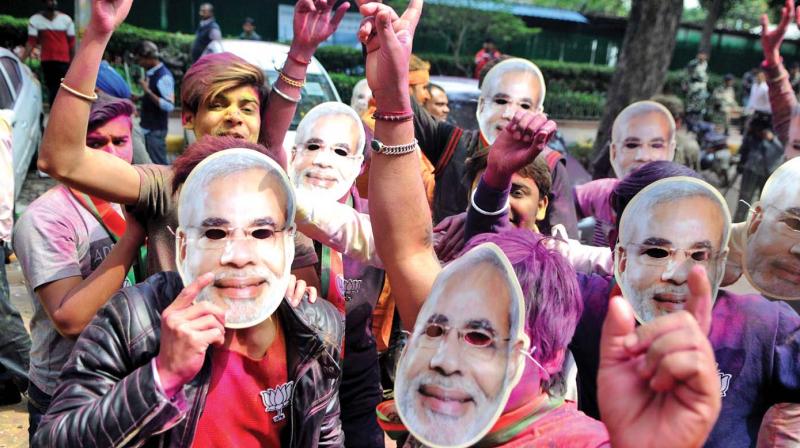TN Assembly polls not referendum on demonetisation

Chennai: The ecstatic victory of the BJP in the latest round of Assembly elections in five States, more so two key states in the Hindi belt - Uttar Pradesh and Uttarakhand — and the saffron party likely to form the next governments in Goa and Manipur also have, naturally, post-facto, given rise to an impression that critics of the Central Govt’s demonetisation of two high value currencies last year, had got it all wrong.
However, as this very modest piece of analysis attempts to unravel, there are at least three reasons why the latest Assembly elections, the first set of important ones held after the note-ban, notwithstanding the resounding win for the Congress in Punjab, could, logically speaking, in no way be construed as a referendum on demonetisation.
Firstly, the basis of comparison itself is problematic. It would have been logically admissible to read the election outcome to be a ‘referendum’ on the dramatic demonetisation decision, most sweeping and shocking in its reach and not the most popular of decisions of the BJP regime as yet, had the just concluded polls been a general election covering all the Indian States and Union territories.
As the policy to demonetise the old Rs 500 and Rs 1, 000 notes was applicable for the entire country, it would be only logically fair to test its after-effect among the electorate in a country-wide election say to the Lok Sabha. Alternately, at least one-half of India’s States should have had a simultaneous election to their respective Legislative Assemblies for them to gauge popular sentiment about a recently implemented all-India policy.
Thus, to conclude from the results of just two or three Assembly elections that the demonetisation decision was vindicated, after all, would amount to identifying the ‘part’ with the ‘whole’. The ‘whole’, as they say in any comparative analysis, is “more than the sum of its parts”. And by the time of the next general election to the Lok Sabha in 2019, the economy would have been sufficiently re-monetised with new notes that ‘demonetisation’ would technically at least, cease to be a poll issue before the people at large.
Second, despite extraneous factors and leadership issues, all the five Assembly elections were fought on substantially state-specific and local issues with anti-incumbency playing a big role in unseating the present rulers in those respective state capitals. In U.P. for instance, the Prime Minister himself hardly spoke about ‘demonetisation’ per se; rather Mr. Modi’s campaign speeches harped on his fight against ‘Kaala Dhan’ (black money) that naturally has wider moral overtones, particularly in less economically developed States, besides development issues.
The saffron surge in the North-East, Manipur now included, has been part of a different political dynamics altogether in recent years in the backdrop of larger issues like the Nagas’ demand for redrawing of territories and the influx of Bangladeshi immigrants.
Again in a State like Punjab, as Capt. Amrinder Singh, indicated in an interview, the biggest social problem for a relatively affluent state, which was at the heart of India’s Green Revolution, has been the menace posed by drugs. Thus, a variety of region-specific issues, including redrawing of local caste equations, besides performance, have played a role in deciding poll outcomes in these five States and note-ban was hardly on the radar.
Thirdly, the acute liquidity crunch, which the substantially huge informal sector workers and several large clusters of small and medium industries had to painfully face post-demonetisation, is not just a short-term issue. Its medium to long-term impact on the economy and society as a whole, including other sections of the population, is something that would pan out as a process over a much longer time frame.
Some of the later justifications offered for the ‘demonetisation’, like triggering transition to a less-cash and digital economy, which Nobel Laureate Prof Amartya Sen and several other experts termed as an ‘after thought’ by the BJP government, also imply deeper issues about restricting social choices for the people and seeking to influence lifestyles.
This approach also runs the risk of being suffused with overtones of the ‘Moral Police’. Some commentators, defending the note-ban, even pointed out that “harsh and painful steps are necessary” to “discipline society” and to “make our society ethical”, which has serious implications for democracy itself. It is a throwback to the famous ‘Kenneth Arrow paradox’ in the 1920s’, so named after the American Nobel Laureate in Economics, Kenneth Arrow. Very simply put, attempt in any society to order a ‘single social order preference’ that is ‘good’ for everyone from a set of diverse, individual preferences, is possible only in a dictatorship or totalitarian socio-political set-up.
This has given rise to a continuing debate in development economics, on how best to complement individual freedoms with larger societal goals of equality, social justice and reasonable re-distribution of wealth generated in a society at any point of time. It is also a raging philosophical issue that still continues to engage some of the world’s finest minds from John Rawls to Amartya Sen.
Demonetisation’ as a way of redistributing surplus wealth in a society to the hands of the poor, may have struck a chord with the poorer sections of society; but it is no simplistic one-size-fits-all, top-to-bottom development model which the present government’s ‘Aadhar-Jhan Dhan-Digi-Dhan’ model seems to suggest. For these three reasons, these poll results are in no way a referendum on note-ban.

